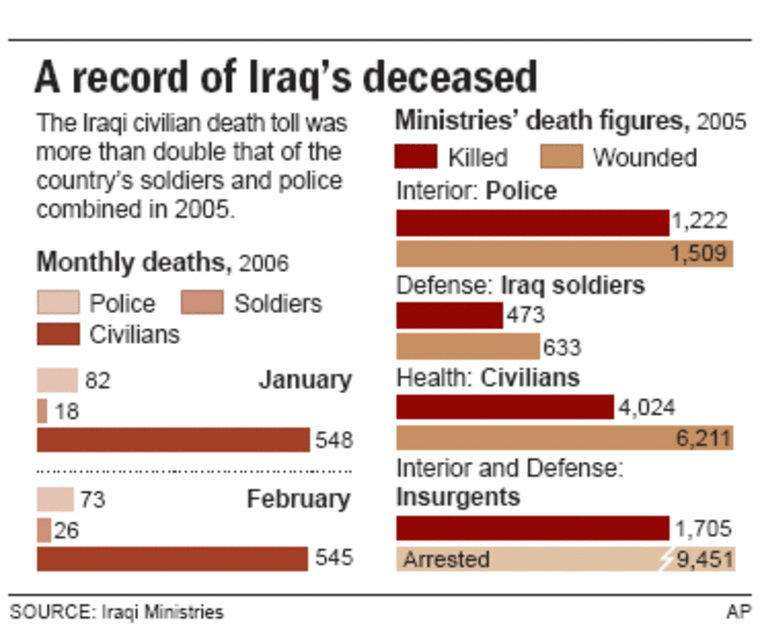Iraq pledged on Saturday to disband sectarian militias and integrate them into the country’s U.S.-trained security forces, a move that has been promised several times in the past but never successfully carried out.
Interior Minister Bayan Jabr, who has been accused of allowing a Shiite militia to operate from his ministry, announced the decision, but at the same time said he saw no need to hurry with the break up of the powerful and feared militias.
“The ministry is ready to receive a limited number of militias and distribute them to avoid the gathering of militias in one area,” said Jabr, a member of Shiite party SCAR, which oversees the Bard movement, a Shiite militia.
He said former militia members would be reassigned to posts with the Iraqi police, border protection, special forces and criminal investigation.
Iraq’s Sunni Arab minority has accused the Interior Ministry of condoning anti-Sunni death squads and says Bard members who have infiltrated police units have killed hundreds of Sunnis in purges around Baghdad. Shiite officials strongly deny this.
Jabr, who said he would be chairing a committee to study the demobilization, said disarming militias would take time.
As well as Bard, several other militia groups operate in Iraq including the Mehdi Army, allied to Shiite cleric Moqtada al-Sadr, and the peshmerga, a vast Kurdish military force. In all, around 100,000 people are tied to militias.
“This subject needs time. There is no reasonable justification for any fear towards the militias at the present time,” he told a news conference, playing down what many Iraqis see as a very real threat.
Ministry ties
Tit-for-tat sectarian killings since the bombing on Feb. 22 of the Golden Mosque in Samarra, one of the four holiest Shiite shrines in Iraq, have left hundreds of people dead and pushed the country toward the brink of civil war.
Sunnis have accused militiamen loyal to Sadr, a strongly anti-American cleric, of being behind many reprisal killings.
Washington’s hopes of sending home some of the 133,000 troops in Iraq have been dented as militias drawn along ethnic and sectarian lines squared off, ready to defend their turf.
Last month, U.S. envoy Zalmay Khalilzad, in unusually blunt words, said Washington would not tolerate sectarianism or militias in the government and its security forces.
U.S. officials have voiced mounting concern that violence by pro-government, pro-Iranian Shiite militia members could prolong unrest by alienating Sunnis, delaying a U.S. withdrawal.
The militia backgrounds of many policemen and soldiers have raised questions over their loyalties should they have to confront irregular forces in an all-out war. In many southern, Shiite cities, police and militia are often indistinguishable.
Leaders of the mainly Shiite and Kurdish government were themselves militia commanders when in opposition to Saddam Hussein, raising questions as to their commitment to disband.

The Bard militia was originally formed in exile in Iran in the early 1980s, and fought against Saddam’s forces during the 1980-88 Iran-Iraq war.
President Jalal Talabani, a Kurd, met General John Abizaid, the overall commander of U.S. operations in the Middle East, and afterwards called on militias to disband, but peshmerga units loyal to him remain active in northern Kurdistan.
Redeploying militiamen with sectarian affiliations to criminal investigations would also prove complicated.
The U.S. military said last month it uncovered a death squad operating from Jabr’s Interior Ministry and said the same ministry were investigating the incident.